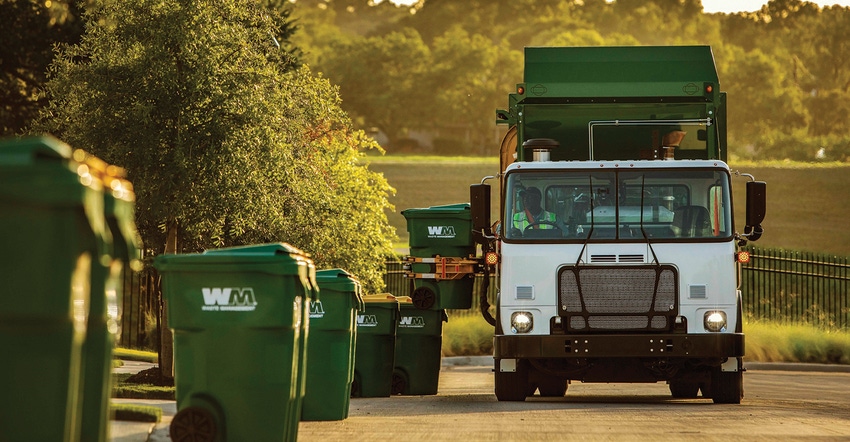WM reported strong financial results in Q1 on robust recycling commodities pricing, yet challenges remain. CEO Jim Fish expressed confidence in the Houston-based waste services provider reaching full-year guidance despite inflationary pressures.

Core price, collection yields and robust volumes drove a strong first quarter for Waste Management (WM) in the first quarter of the year.
CEO Jim Fish expressed confidence in the Houston-based waste services provider reaching full-year guidance despite inflationary pressures.
Recent figures ended March 2022 indicated the Consumer Price Index (CPI) rose 8.5 percent over the last 12 months, the highest since December 1981. CPI is expected to be at 7 percent ending April 2022 as rising interest rates, labor costs and energy prices continue to affect U.S. economic activity.
“I am proud of how we continue to respond to inflationary pressures in our business," Fish said. "Our teams executed remarkably well, delivering double-digit growth in revenue, operating EBITDA and net cash provided by operating activities in the quarter. We also advanced our long-term strategic priorities of providing the best workplace for our employees, progressing technology and automation that differentiates WM and reduces costs and leveraging our sustainability platform for growth.”
Fish indicated that key performance indicators including special waste volumes, construction and demolition volumes, and new business formation drove WM to report operating EBITDA for collection and disposal at $1.4 billion, or 31.2 percent of revenue, in Q1 2022, compared to $1.3 billion, or 31.8 percent of revenue, for the first quarter of 2021. Recycling commodities pricing was a significant factor as well as delayed approval of alternative fuel tax credits.
Revenues reached $4.66 billion in Q1, with core price at 7.3 percent, up from 3.4 percent year over year (YOY). Collection and disposal yields more than doubled to 5.5 percent, up from 2.8 percent in Q1 2021.
Total company volumes grew 3.6 percent in Q1, a welcome increase from the 3.3 percent decline the previous year's quarter. WM saw free cash flow reach $845 million compared to $865 million YOY, including sustainability growth investments.
Fish touted WM's sustainability and technology investments over the past year, saying that the company was "excited about the future." The company plans to invest in further sustainability projects including expanding recycling facility capacity, automating recycling processing and increasing the renewable energy generated from landfills. Fish referenced the company's new recycling that opened in Q1 and announced that WM is "on track" with another full-retrofitted facility for the second quarter as well as renewal gas projects.
The company increased technology investments in Q1, utilizing automation and optimization to enhance processes and battle labor shortages. Fish said it "involves creating a competitive advantage by differentiating the customer experience while reducing our labor dependency on certain roles."
Despite digital strategies at the forefront of initiatives, WM anticipated to unlock 5,000 to 7,000 new jobs over the next four years.
"In this tight and expensive job, it makes complete sense to use technology to reduce our dependency on certain high turnover jobs," he commented. "In addition to tackling this attrition, technology produces a significant amount of data that we view as a valuable asset. While we use automation and data to our advantage, we will invest in training and upskilling of our existing employees to existing employees to ready them for higher-skilled future roles."
COO John Morris reiterated that 2022's "began on a high note," with expectations that Q1 would be the best performing quarter of the year. The anticipated results exceeded company expectations as organic revenue growth for collection and disposal topped 9 percent.
Touting the strong core price in Q1, he said that WM is working on keeping price increases on track with the current inflationary environment. Fleet and maintenance costs also are anticipated to rise in 2022, driven by delays in truck deliveries and ongoing supply chain restraints.
Blended average commodity price in Q1 was $126 per ton, in line with four-year expectations.
"We continue to see strong demand for recycled materials and we remain focused on educating customers to help unlock additional supply of recyclables and applying technology to maximize the value of the material recovered while reducing our costs across," Morris commented.
WM plans to bolster its residential collection business, a long-term plan aimed at pricing and automation. High labor costs are most evident in this segment of the business, leading WM to focus on pricing contracts and reducing costs through the transition of residential fleets to automated single-driver vehicles.
Morris concluded by providing details of WM's renewable energy business which added $13 million of operating revenue in Q1. WM's new Oklahoma renewable natural gas plant is anticipated to come online "in the next few weeks," with another project to be in service by the end of the year.
About the Author(s)
You May Also Like




